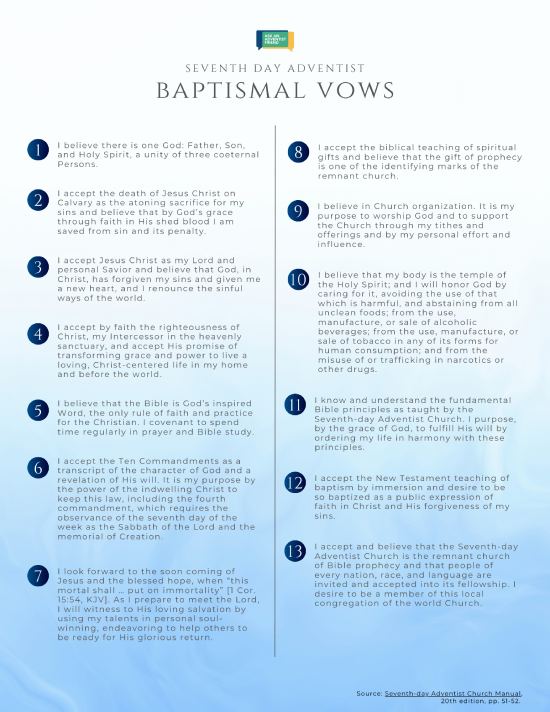
For the full baptismal vows, download the infographic
Beliefs are personal, and being an Adventist is about more than having a church membership. So, no, nothing can truly stop you from being an Adventist. It’s your decision.
(And it’s worth noting that you don’t have to be a member of an Adventist Church to attend its worship services and other church activities. You are always welcome and celebrated!)
If you’re looking to officially become a member of an Adventist Church, it involves accepting the denomination’s collective beliefs. And realistically, this also means acknowledging that you’re joining a faith community of human beings who share some traditions and expectations—along with some potential idiosyncrasies and quirks. (And this would be the case for joining just about any Protestant Christian faith community.)
But in general, the expectations among Adventists are simple and straightforward. And they’re related to truths from the Bible that Adventists together embrace.
Nonetheless, accepting these beliefs is not at all about earning salvation. That is a gift received by faith in Christ and has nothing to do with church membership. So to be extra clear, this page doesn’t focus on how to be saved.
Rather, we’re here to look at what beliefs and lifestyle choices come with being part of an Adventist community. You can expect to learn:
To answer the question you came here for, let’s first understand the distinctions between being saved, being an Adventist, and being a member of the Adventist Church.
What does “becoming an Adventist” mean?

Photo by Aaron Burden on Unsplash
Seventh-day Adventism is about following Christ; all our other beliefs stem from His love and His gift of salvation, as shown in the Bible. Thus, anyone who holds these beliefs could consider themselves an Adventist believer.
But again, to be clear, we’re not saying that someone needs to be an Adventist in order to get to know Jesus Christ or to be saved. Absolutely not. Salvation is a decision you make in your heart, between you and God, as it says in Romans 10:9:
“If you confess with your mouth that Jesus is Lord and believe in your heart that God raised Him from the dead, you will be saved” (ESV).
So if you’ve ever been concerned that you need to be part of a certain church to be saved, rest assured this isn’t the case. So now we’ll focus on what it means to be a Seventh-day Adventist Christian.
(If you want to learn more about how salvation works, see “What Is Salvation and How Do I Get Saved?”)
As we’ve mentioned, there is a set of “fundamental beliefs” that describe how Adventism approaches Scripture and how Adventists seek to apply its principles to our lives. If you align with those beliefs, you would, by definition, be an Adventist.
Distinct from this is the process of membership in the Adventist Church.
Church membership refers to officially accepting Adventist beliefs and joining by baptism or by profession of faith (if you’ve been baptized in another Protestant Christian denomination). We’ll talk about that process next.
Prerequisites for becoming a member of the Adventist Church
Church membership involves three steps, as expressed in the Seventh-day Adventist Church Manual1:
- Baptism
- Acceptance of the truths of the Bible as taught in the Fundamental Beliefs of the Adventist Church
- Formal acceptance as a member
These prerequisites align with Jesus’ instructions to make disciples by both baptizing and teaching them:
“Go therefore and make disciples of all the nations, baptizing them in the name of the Father and of the Son and of the Holy Spirit, teaching them to observe all things that I have commanded you” (Matthew 28:19-20, NKJV).
Here’s a little more about each one.
Baptism

Photo by kaleb tapp on Unsplash
Baptism is a public announcement of a person’s decision to follow Christ. It symbolizes the person allowing their old life to die with Christ’s sacrificial death so they can live a new life in Him (Romans 6:3-4).
The Bible teaches that when we’re baptized, we’re joining the body of Christ—the Church (1 Corinthians 12:13). Thus, the logical next step after baptism is joining a community of believers.
In some cases, a person who wants to join the Adventist Church may already be “a committed Christian coming from another Christian communion who has already been baptized by immersion.”2 This person may join by a “profession of faith”—a verbal acknowledgment—rather than being baptized again.
This is because baptism, like accepting Jesus, doesn’t need to be repeated (unless an individual feels convicted to officially recommit themselves to following Him). In many cases, an individual has already made a decision to follow Jesus and has shown that publicly through baptism prior to learning about Adventism. So, joining the Adventist Church is simply a continuation of that journey.
Acceptance of the Fundamental Beliefs of the Adventist Church
When a person decides they would like to become part of the Adventist Church, a pastor or other church member will study the Bible together with them so they fully understand the decision they’re making. This also provides one-on-one time with a pastor or elder to ask any questions they might have.
This study will usually happen over many weeks before baptism or profession of faith.
After finishing the baptismal study, a person will be asked to affirm baptismal vows that show their acceptance of the beliefs of the Adventist Church. There are 13 of them, and they’re mostly a summary of our 28 Fundamental Beliefs.
These vows include both beliefs and lifestyle choices that encompass what it means to be a Seventh-day Adventist.
Beliefs such as:
- The Godhead/Trinity
- Salvation through Jesus’ death on the Cross
- Jesus’ ministry in the heavenly sanctuary
- The Bible as God’s inspired Word
- The Ten Commandments (including the Sabbath)
- The Second Coming of Jesus
- Spiritual gifts and the gift of prophecy
Some of the beliefs also address practical aspirations and applications like:
- Spending regular time in prayer and Bible study
- Supporting the church with tithe and offerings
- Choosing to avoid unclean meat, alcohol, tobacco, and narcotics out of a desire to care for the bodies God created for us
- Being baptized by immersion
Formal acceptance as a member
Once an individual has been baptized, the church will take a vote to accept them into membership. This “vote,” though, is just an official way of showing that the church is welcoming the new member with open arms. In other words, its presentation as a “vote” gives the whole church the chance to say, “Yes!”
Norms within the Adventist Church

Photo by NordWood Themes on Unsplash
Every community has its norms and sets of expectations. The Adventist Church is no different. And though these norms are not requirements for membership, you will definitely run into them if you spend much time around Adventists.
One of the most common is the aspiration toward healthy living. Out of a desire to be good stewards of our bodies, many members choose to eat a vegetarian diet and avoid drinking caffeine. And in many places, you might find that the church potluck, or fellowship dinner after the church service, is mostly vegan dishes.
Though it’s a typical aspect of Adventist culture, vegetarianism is by no means a test of membership. Each individual should choose what they feel is best for their bodies and their health in their current circumstances.
Another typical norm is minimal adornment or use of jewelry.
If you walk into an Adventist church, you might not see as many people wearing necklaces, bracelets, or earrings. Some even prefer not to wear wedding rings. There are no official guidelines about individual pieces of jewelry, though. In general, this focus is out of a desire to live simple, modest lives.
Again, though, we recognize this is a personal choice between an individual and God. Each of us is unique, and individual self-expression is ultimately between a person and God. If someone is wearing jewelry, they should expect to be treated no differently by church members.
One other norm you may encounter is an emphasis on the writings of Ellen White, someone Adventists believe to have had the gift of prophecy (1 Corinthians 12:10; Romans 12:3-8). She was a co-founder of our denomination, and she wrote a large number of books, manuscripts, and letters that point people to Jesus and the Bible, so you may hear church members referring to things she wrote or said.
But it’s not a requirement for you to read her writings or learn all her specific counsel. (And if she were alive today, she’d tell you to read the Bible first, anyway!3)
Accepting Ellen White as a prophet is not mandatory in order to be an Adventist. Though we would encourage you to learn about her and judge for yourself whether she had the spiritual gift of prophecy.
That’s the beauty of growing together in Christ in the Adventist Church. We can unite on core beliefs while still seeking God’s will individually through Scripture and prayer.
(For more on Adventist norms, see “Do Seventh-day Adventists Have ‘Rules’?”)
Adventists want to support you in your spiritual journey
Wherever you are in your spiritual journey, you can know that God hears your prayers and His Holy Spirit will guide you. He has promised to lead every sincere seeker to the liberating truths of His Word. He will also lead you to the right faith community where you can continue to grow and follow Him.
If you’re curious about the Adventist Church and what it would be like to join one of our local congregations, a good way to find out would be to attend a service at one nearby. Whether you’re a member or not, you can expect to be welcomed by people who are sincerely glad you’re there.
You may even decide you’d like to learn more about our beliefs. In that case, a pastor, church elder, or Bible worker would be happy to talk with you, answer your questions, and study the Bible with you.
To get started, find a church near you and contact them through their website, Facebook page, phone number, or whichever is most convenient for you. Or attend in person! We’d love to support you in your journey.
To learn more about what to expect the first time you attend an Adventist Church, check out our walk-through of a typical service and Sabbath School.
- Seventh-day Adventist Church Manual, 20th edition, pp. 49-56. [↵]
- Ibid., p. 56. [↵]
- White, Ellen G., The Review and Herald (January 20, 1903), par. 9. [↵]
More Answers
Do Seventh-Day Adventists Have “Rules” For Clothing?
Many religions have guidelines on dress, but what about the Adventist Church? Discover how Adventists choose to dress based on biblical principles.
11 Reasons People Become Seventh-day Adventists
Curious why many people become Adventists? Here are elements of Adventist beliefs, values, and mission often reflected in people’s decisions to join.
What’s the Seventh-day Adventist General Conference Session?
At the General Conference Session, Adventist delegates from around the world gather to assess the state of the organization, pray, and discuss current issues. Here’s how it works.
How Adventists View the End of the World
The end of the world is no fun to think about. But here’s how we can actually find hope and comfort in what’s to come.
What Is an Adventist Medical Missionary?
A medical missionary in the Adventist Church is someone who cares for the medical needs of people as a way of showing the love of Jesus. They may travel to another country, or even just serve in their hometown.
Is the Seventh-day Adventist Church Protestant?
Learn how the beliefs of the Seventh-day Adventist Church align with the “5 solas” of Protestantism.
Are Seventh-day Adventists Evangelicals?
According to its origins and definition, evangelicalism is about following Jesus and the Bible and sharing the Gospel through the way we live our lives. Adventists wholeheartedly harmonize with these principles.
Do Seventh-day Adventists Have “Rules”?
We uphold principles we believe will help us maintain a closer relationship with Jesus and His Word. Learn how these principles guide Adventist lifestyles.
Do Seventh-day Adventists Have “Rules” For Marriage?
Around the world, many cultures and religions have various marriage traditions, expectations, or even rules when it comes to choosing a partner, planning the wedding, extended family logistics, or a number of other things.
Can a Seventh-day Adventist Marry a Non-Adventist?
Yes. Seventh-day Adventists are not under any official rules that dictate who they can or cannot marry. This is a personal, life-altering decision between the couple and God.
What Adventists Believe About Alcohol and Tobacco Use
The Seventh-day Adventist Church has historically discouraged the use of alcohol and tobacco. Even before the church started in 1863, its leaders were realizing the negative effects of these substances.
Jewelry—Why Do Many Seventh-day Adventists Choose Not to Wear It?
If you walk into a Seventh-day Adventist church service, you might notice that many people aren’t wearing earrings, bracelets, necklaces, or sometimes even wedding rings.
International Pathfinder Camporee
Youth aged 10-15 in the Adventist Church’s global Pathfinder program look forward to the International Camporee every 5 years. This event brings together Pathfinders from around the world for exciting activities.
How Adventists interpret Bible prophecy
Bible prophecy conjures up a variety of emotions in people. For some, it feels exciting or mysterious.
Moviegoers’ Guide to The Hopeful: The Facts Behind the Film
Learn where and when you can watch The Hopeful and how to get tickets. Already seen it? We’ll uncover the real story that inspired this film.
How Are Seventh-day Adventists Different from Other Protestants?
As a Protestant Christian denomination, the Seventh-day Adventist Church regards the Bible as the ultimate guide and looks to Jesus Christ as the only way to salvation. We do have some differences of belief or interpretation when it comes to topics like Bible prophecy, end-time events, the Sabbath, and a person’s state after death.
How Adventists Handle Death and Funerals
Most Seventh-day Adventist funeral services are similar to those of other Protestant denominations, such as Methodists, Baptists, or Presbyterians, but you might find a few differences or unique nuances.
Adventist Culture
Many Seventh-day Adventists adhere to specific lifestyle principles that can make them stand out from those in other Christian denominations. Whether it’s going to church services on Saturday or eating the popular Adventist entrée of “haystacks.”
Do Adventists Observe Easter-Related Holidays?
Jesus Christ’s resurrection, celebrated on many Easter-related holidays, is central to the beliefs of the Seventh-day Adventist Church. And that means we seek every opportunity to remember it.
An Overview of Seventh-day Adventist Higher Education
The Seventh-day Adventist Church has about 118 tertiary schools around the world. Though many of them are within North America, you’ll also find Adventist universities in countries across the world—places like Croatia, Austria, Brazil, Madagascar, and the Philippines.
The Ten Commandments from a Seventh-day Adventist Perspective
Ever eaten a salad and gotten a big piece of green stuck in your teeth? And you didn’t realize it was there until you looked in the mirror? (Because no one ever told you!)
The Benefits of A Seventh-day Adventist Academy
Adventist academies are high schools (grades 9-12) that are owned and operated by the Seventh-day Adventist Church.
Are Seventh-day Adventists Christians?
Yes, the Seventh-day Adventist Church is a Protestant Christian denomination formed in 1863. Just like other Christians, we believe that Jesus Christ is our Savior and seek to follow the principles of the Word of God.
Adventist Movies: Where Faith and Film Meet
The Adventist Church uses film to share our faith and uplift positive values. Learn more about specific Adventist-produced films and where to find them.
Do Adventists Celebrate Christmas?
In general, most Seventh-day Adventists do celebrate Christmas.
Since our denomination doesn’t have specific guidelines about holidays, it’s up to each member to decide whether to celebrate it based on their personal convictions and study of the Bible.
What Does the Bible Say About Modesty
Seventh-day Adventists and Christians in general try to ensure their outward presentation and lifestyle glorify God. This often involves daily habits like the ways we hold conversations, the ways we dress and accessorize, and the ways we regard other people when we’re out and about.
How Do Adventists Make Movie and Music Choices?
How do Adventists decide what music to listen to and which movies to watch? Learn how Bible principles can help us make better entertainment choices.
Does the Seventh-day Adventist Church Believe in Paying Tithe?
Seventh-day Adventists believe in paying tithe and offerings based on the biblical command and our commitment to being wise stewards of God’s resources. These donations help fund the mission of the Adventist Church by supporting pastors, missionaries, church expenses, and evangelistic projects, among other things.
Seventh-day Adventist World Population and Demographics
The Adventist Church has more than 22 million members and 100,000 churches worldwide, plus a large system of hospitals, schools, and publishing houses. Learn more about this diverse church.
Didn’t find your answer? Ask us!
We understand your concern of having questions but not knowing who to ask—we’ve felt it ourselves. When you’re ready to learn more about Adventists, send us a question! We know a thing or two about Adventists.





























